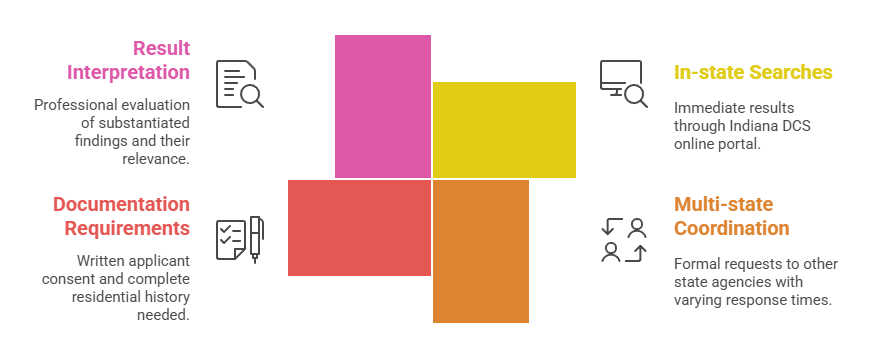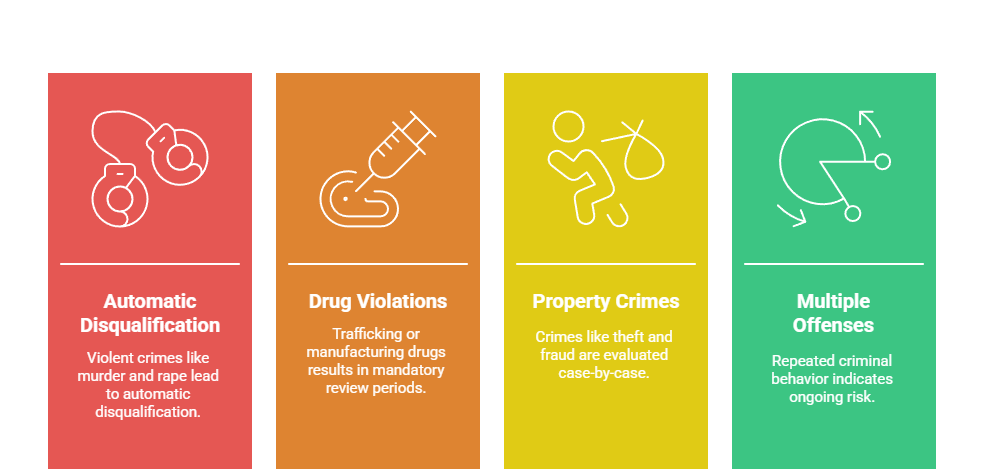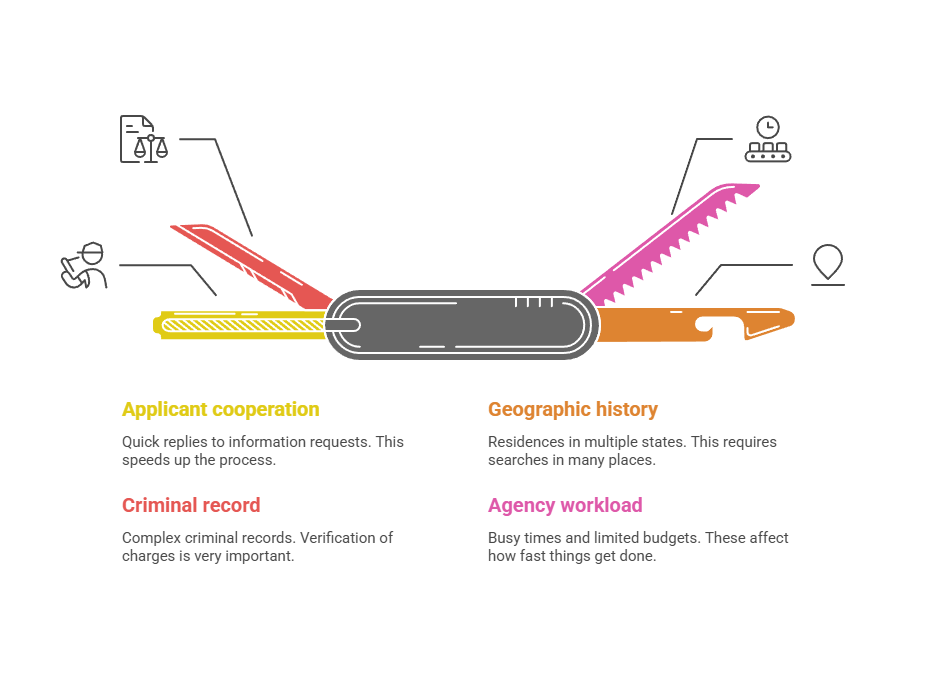Indiana education employee background checks are mandatory screening processes that include criminal history verification, child abuse registry searches, and fingerprint-based FBI checks for all school personnel. These comprehensive screenings ensure student safety while helping educational institutions maintain compliance with state and federal hiring regulations.
Key Takeaways
- Indiana school district hiring requirements mandate comprehensive background screenings for all educational staff, including teachers, administrators, substitutes, and support personnel working in K-12 environments.
- Criminal history checks must include both state-level Indiana records and federal FBI fingerprint-based screenings conducted through authorized channels within the past 365 days.
- Child protection registry searches are required across Indiana's Department of Child Services database and may include out-of-state registry checks for recent residents from other jurisdictions.
- Fingerprinting requirements involve live-scan electronic submission through approved vendors, with results processed through both state and federal databases for comprehensive criminal background verification.
- Compliance timelines typically require background check completion within 30 days of hire, with some districts requiring clearance before the employee's first day of direct student contact.
- Ongoing monitoring responsibilities may include periodic re-screening every three to five years, depending on district policies and specific job roles within the educational environment.
Understanding Indiana's Legal Framework for Education Background Checks
Indiana's educational background check requirements stem from multiple state statutes and federal regulations designed to protect students. The Indiana Code Title 20 establishes comprehensive screening mandates for all school personnel. Meanwhile, federal laws like the Every Student Succeeds Act add additional layers of protection. These regulations create a robust framework ensuring thorough vetting of education employees.
Indiana school district hiring requirements extend beyond traditional teaching positions to encompass all staff members with potential student access. This includes custodial workers, food service personnel, transportation staff, and volunteer coaches. Furthermore, the state's approach recognizes that student safety depends on screening everyone within the school environment. Therefore, districts must verify all personnel regardless of their direct instructional responsibilities.
School boards must implement comprehensive policies that address various employment scenarios and exceptions. Additionally, these policies must balance public safety concerns with fair employment practices. Moreover, districts need clear procedures for handling complex criminal history findings and appeals processes.
State-Specific Statutory Requirements
Indiana education compliance screening operates under IC 20-26-5-10, which mandates criminal history checks for school employees. This statute requires districts to obtain both state criminal records and federal background information before employment begins. The law also specifies disqualifying offenses and provides guidance on evaluating criminal history findings.
The Indiana Department of Education maintains detailed guidance documents outlining specific procedures for background check compliance. These resources help school districts navigate complex requirements while ensuring consistent application across all educational institutions statewide.
Federal Compliance Obligations
Federal requirements complement state laws by adding nationwide criminal database searches and specialized screening protocols. The Individuals with Disabilities Education Act (IDEA) includes specific background check provisions for special education staff. Additionally, Title IX regulations influence screening requirements, particularly for athletic personnel and student activity supervisors. Consequently, districts must coordinate multiple regulatory frameworks to ensure complete compliance.
School staff background verification must align with federal civil rights protections, ensuring screening processes don't create discriminatory barriers while maintaining safety standards. This balance requires careful policy development and consistent implementation across all hiring decisions. Furthermore, districts must document their decision-making processes to demonstrate fair and consistent application of screening standards.
Required Background Check Components for Indiana Education Employees

Indiana's comprehensive screening process includes multiple components designed to identify potential risks to student safety. Criminal history searches form the foundation, supplemented by specialized registry checks and reference verifications. Moreover, each component serves a specific purpose in creating a complete picture of an applicant's background and suitability for educational employment. Therefore, districts cannot skip or substitute any required component without potentially compromising compliance.
K-12 background checks in Indiana must include both in-state and national criminal database searches conducted within the past 365 days. These searches encompass felony and misdemeanor convictions, pending criminal charges, and certain arrest records that may indicate ongoing investigations. The comprehensive approach ensures no significant criminal history goes undetected during the hiring process.
| Component Type | Scope |
| State Criminal History | Indiana records only |
| FBI Fingerprint Check | National databases |
| Child Abuse Registry | Indiana DCS database |
| Reference Verification | Previous employment records |
| Education Credential Verification | Degree and certification confirmation |
School districts must verify each component through authorized providers to ensure accuracy and legal compliance. Additionally, districts should maintain detailed records of all screening activities for audit and legal protection purposes.
Criminal History Verification Process
The criminal background component requires searches through both state and federal databases to ensure comprehensive coverage. Indiana State Police maintain state criminal records, while FBI databases provide national coverage including multi-state offenses. Consequently, fingerprint-based searches offer the highest accuracy by eliminating name-based matching errors.
Districts must use authorized background check providers who can access official law enforcement databases. These providers ensure proper chain of custody for fingerprint cards and maintain appropriate security protocols for sensitive criminal justice information.
Educational Credential Authentication
School districts must verify educational credentials independently from background check providers. This process involves contacting degree-granting institutions directly or using authorized credential verification services. Additionally, teaching licenses and professional certifications require separate verification through state licensing boards. Therefore, districts should build adequate time into their hiring schedules to accommodate multiple verification processes.
Fraudulent credentials represent a growing concern in educational hiring, making independent verification essential. Moreover, some diploma mills and unaccredited institutions create challenges in distinguishing legitimate educational achievements. Consequently, HR professionals must carefully research unfamiliar institutions and require official transcripts for all claimed degrees.
Child Protection Registry and Safety Clearances
Indiana education employee background checks include mandatory searches of child protection registries to identify individuals with substantiated abuse or neglect findings. The Indiana Department of Child Services maintains the state's central registry, which contains records of individuals deemed unsuitable for positions involving child care or supervision. This screening component represents a critical safety measure for educational environments.
Child abuse registry searches extend beyond Indiana's borders for applicants who lived in other states during the previous five years. Multi-state registry checks ensure comprehensive coverage of an individual's history with child protective services. These searches require specific authorization from the applicant and must be conducted through official state agencies rather than third-party databases.
Out-of-state registry requirements vary significantly between jurisdictions, creating complexity for school districts hiring from diverse geographic areas. Some states maintain publicly accessible databases, while others require formal requests through designated agencies. Indiana school district hiring requirements mandate completion of all applicable registry searches before finalizing employment offers.

- In-state searches: Direct access through Indiana DCS online portal with immediate results
- Multi-state coordination: Formal requests to other state agencies with varying response times
- Documentation requirements: Written applicant consent and complete residential history
- Result interpretation: Professional evaluation of substantiated findings and their relevance
Districts must establish clear procedures for requesting and interpreting registry search results. Additionally, staff responsible for these searches need appropriate training on legal requirements and confidentiality protections.
Fingerprinting and FBI Database Searches
Live-scan electronic fingerprinting represents the gold standard for school staff background verification in Indiana. This process captures high-quality digital fingerprint images transmitted directly to state and federal databases for comparison against criminal records. Electronic submission eliminates delays associated with mail processing while reducing errors from poor print quality or damaged cards. Furthermore, live-scan technology provides immediate confirmation of successful submission, reducing anxiety for applicants and hiring delays for districts.
Indiana education compliance screening requires fingerprinting through state-approved vendors who maintain proper equipment and certification. These vendors typically include local law enforcement agencies, school district offices, and private companies licensed to provide fingerprinting services. Appointment availability varies significantly, particularly during peak hiring seasons when demand increases substantially. Therefore, districts should encourage early scheduling and maintain relationships with multiple providers to ensure timely processing.
Vendor Selection and Scheduling
Districts should evaluate fingerprinting vendors based on several key criteria to ensure reliable service. Location convenience affects applicant experience, while appointment availability impacts hiring timelines. Additionally, cost considerations influence budget planning, particularly for districts processing large numbers of applications.
| Vendor Type | Average Cost | Appointment Flexibility |
| School District Office | $25-40 | Limited hours |
| Local Law Enforcement | $35-50 | Business hours only |
| Private Vendor | $45-65 | Extended availability |
Results from FBI database searches include detailed criminal history information when records exist, or confirmation of no criminal record on file. The quality and completeness of results depend on the accuracy of reporting by contributing agencies and the quality of fingerprint submission.
Processing and Result Interpretation
FBI fingerprint search results typically arrive within 7-14 business days of electronic submission. However, processing times can extend during peak periods or when additional verification is required. Moreover, incomplete or unclear fingerprints may require resubmission, adding additional delays to the hiring process.
Criminal history records require careful interpretation by qualified personnel familiar with legal terminology and disqualification criteria. Additionally, districts must distinguish between arrests and convictions while evaluating the relevance of various offense types to educational employment. Consequently, many districts consult legal counsel when complex criminal history findings require evaluation.
Disqualifying Offenses and Employment Decisions
Indiana law establishes specific categories of criminal offenses that automatically disqualify individuals from educational employment. These include violent crimes against persons, sexual offenses, drug trafficking violations, and crimes involving children or vulnerable populations. K-12 background checks must carefully evaluate all findings against established disqualification criteria while considering individual circumstances and rehabilitation efforts. Additionally, districts must apply consistent standards across all applicants to ensure fair treatment and legal compliance.

- Automatic disqualification offenses: Murder, rape, child molestation, kidnapping, and other specified violent crimes regardless of timeframe
- Drug-related violations: Trafficking, dealing, or manufacturing controlled substances with mandatory review periods
- Property crimes: Theft, fraud, or embezzlement requiring case-by-case evaluation based on severity and circumstances
- Multiple offense patterns: Repeated criminal behavior indicating ongoing risk regardless of individual offense severity
Automatic disqualification applies to certain serious felonies regardless of when they occurred or the individual's subsequent conduct. These offenses typically include murder, rape, child molestation, and other crimes deemed incompatible with educational environments. However, many criminal findings require individualized assessment considering factors like offense severity, time elapsed, and evidence of rehabilitation.
Decision-Making Framework
Indiana school district hiring requirements allow for discretionary decision-making regarding many criminal findings that don't trigger automatic disqualification. Districts must develop consistent evaluation procedures that consider public safety while providing fair consideration for qualified applicants with minor or dated criminal history. This balance requires clear policies and thorough documentation of decision-making processes.
The assessment process should consider multiple factors when evaluating criminal history findings that don't result in automatic disqualification. Offense severity and nature require primary consideration, with violent crimes receiving greater scrutiny than property offenses. Additionally, crimes against children warrant particular attention in educational settings regardless of their technical classification.
Appeal and Review Procedures
Districts should establish formal appeal procedures allowing applicants to contest background check findings or decisions based on those findings. These procedures must provide due process protections while maintaining institutional authority over hiring decisions. Moreover, appeal processes should include specific timelines and clear standards for review to ensure fairness and consistency.
Legal counsel should review all appeal procedures to ensure compliance with federal and state employment laws. Additionally, districts must maintain detailed documentation of all decisions and appeals to support their position in potential legal challenges. Furthermore, regular policy review helps ensure continued compliance with evolving legal requirements.
Timeline and Processing Procedures
Indiana education employee background checks typically require 10-21 business days for complete processing, depending on the complexity of an applicant's history and the responsiveness of various agencies involved. State criminal history checks generally process within 3-5 business days, while federal FBI fingerprint searches require 7-14 business days. Additionally, processing times can vary significantly based on current agency workloads and seasonal hiring patterns. Therefore, districts must plan accordingly to avoid delays in filling critical positions.
Factors Affecting Processing Speed
Several variables influence background check processing timelines beyond standard agency schedules. Applicant history complexity represents a primary factor, with individuals who lived in multiple states requiring additional verification time. Moreover, incomplete applications cause significant delays when agencies request additional information or documentation.

- Applicant cooperation: Prompt response to requests for additional information or documentation
- Geographic history: Multiple state residences requiring coordinated searches across jurisdictions
- Criminal record complexity: Detailed verification of charges, dispositions, and court records
- Agency workload: Peak hiring seasons and budget constraints affecting processing capacity
School districts should initiate background checks immediately upon conditional job offers to minimize delays in the hiring process. Many districts require background check clearance before an employee's first day of student contact, making early initiation critical for meeting staffing needs. Rush processing options exist for urgent situations but typically involve additional fees and may not be available from all providers.
Expedited Processing Strategies
Several approaches can help accelerate the background check process when timing is critical. Electronic submission methods consistently process faster than traditional paper-based systems. Additionally, complete and accurate initial applications prevent delays from information requests or clarification needs.
Districts should establish relationships with reliable background check providers who offer consistent turnaround times and responsive customer service during peak hiring periods. Furthermore, maintaining clear communication channels with vendors helps resolve issues quickly when problems arise. Consequently, investing in vendor relationships often provides long-term benefits beyond individual processing speed improvements.
Ongoing Compliance and Re-screening Requirements
Many Indiana school districts implement periodic re-screening policies requiring updated background checks every 3-5 years for continuing employees. While state law doesn't mandate ongoing screening beyond initial hire, districts recognize that criminal activity can occur after employment begins. Indiana education compliance screening best practices increasingly include continuous monitoring or periodic re-verification to maintain current safety standards. Moreover, liability concerns drive many districts to adopt proactive re-screening policies despite additional costs and administrative burden.
Continuous criminal monitoring services alert employers when employees are arrested or convicted of new offenses during their employment. These services provide real-time notifications allowing districts to take immediate action when necessary. However, continuous monitoring raises privacy considerations and requires clear policies regarding response procedures and due process protections. Additionally, monitoring services vary significantly in coverage scope, accuracy, and cost, requiring careful vendor evaluation.
School staff background verification policies should address both voluntary and mandatory re-screening scenarios. Voluntary re-screening might occur when employees transfer between districts or seek promotion to positions with greater responsibilities. Mandatory re-screening typically follows established time intervals or specific triggering events like criminal arrests or concerning behavior reports.
Continuous Monitoring Implementation
Districts considering continuous monitoring services must evaluate several factors before implementation. Cost considerations include both initial setup fees and ongoing monthly charges per employee. Additionally, monitoring scope varies between vendors, with some providing comprehensive national coverage while others focus on specific geographic regions or offense types.
Privacy protection represents another critical consideration in continuous monitoring programs. Employee notification requirements vary by state, while consent procedures must comply with federal employment law. Furthermore, districts must establish clear procedures for responding to monitoring alerts while protecting employee rights and maintaining confidentiality.
Cost Considerations and Budget Planning
Background check costs for educational institutions vary significantly based on screening components, processing options, and volume discounts available from service providers. Basic state criminal history checks typically cost $15-25 per applicant, while comprehensive packages including FBI fingerprinting and registry searches range from $75-150 per screening. K-12 background checks represent a necessary expense that districts must budget appropriately while seeking cost-effective solutions. Furthermore, cost variations between vendors can be substantial, making thorough comparison shopping essential for budget-conscious districts.
| Screening Component | Individual Cost | Package Discount |
| State Criminal Search | $15-25 | Included |
| FBI Fingerprint Check | $45-65 | Included |
| Child Abuse Registry | $10-20 per state | Included |
| Continuous Monitoring | $2-5 monthly | Volume rates |
Volume pricing arrangements with background check providers can reduce per-applicant costs for larger districts or consortiums of smaller districts. Annual contracts often include guaranteed pricing and priority processing during peak hiring periods. Additionally, districts should evaluate provider options based on total cost, service quality, and processing speed rather than focusing solely on lowest initial pricing. Therefore, comprehensive vendor evaluation should include references from other educational clients and performance metrics beyond basic cost comparisons.
Many districts require applicants to pay background check costs as a condition of employment, while others absorb these expenses as recruitment costs. Legal requirements and competitive hiring markets influence these decisions, with some districts finding that paying screening costs attracts better candidate pools. Moreover, payment responsibility policies should be clearly communicated during the application process to avoid confusion or delays.
Budget Planning Strategies
Effective budget planning requires accurate forecasting of hiring volume and screening needs throughout the fiscal year. Districts should consider both regular hiring cycles and unexpected staffing needs when estimating background check expenses. Additionally, substitute teacher pools and volunteer screening create ongoing costs beyond regular employee hiring.
Cost control strategies include negotiating multi-year contracts with guaranteed pricing and exploring consortium purchasing arrangements with neighboring districts. Furthermore, some vendors offer educational discounts or nonprofit pricing that can reduce overall expenses significantly. Consequently, regular market research helps identify cost-saving opportunities as vendor pricing and services evolve.
Legal Considerations and Risk Management
Educational institutions face significant legal exposure related to background check processes and employment decisions based on criminal history findings. Federal employment laws, including Title VII of the Civil Rights Act, require careful consideration of how criminal history screening impacts protected classes. Additionally, state laws may provide additional protections for individuals with criminal records, creating complex compliance requirements. Therefore, districts must balance safety concerns with legal obligations and fair employment practices.
Documentation requirements for background check processes and employment decisions represent critical risk management considerations. Districts must maintain detailed records supporting their screening procedures, decision-making criteria, and individual case evaluations. Moreover, these records may be subject to legal discovery in employment disputes or discrimination claims. Consequently, comprehensive documentation policies protect districts while demonstrating compliance with legal requirements.
Legal counsel involvement in policy development and complex cases helps ensure compliance while protecting institutional interests. Additionally, regular policy review and staff training help maintain consistent application of screening standards. Furthermore, staying current with evolving legal requirements prevents compliance gaps that could expose districts to liability. Therefore, proactive legal risk management represents an essential component of effective background check programs.
Conclusion
Indiana education employee background checks represent essential safety measures protecting students while ensuring qualified staff can serve in educational environments. The comprehensive screening process, including criminal history searches, fingerprinting, and registry verifications, creates multiple layers of protection that work together to identify potential risks. School districts must balance thorough screening with efficient hiring processes, requiring careful planning and reliable service provider relationships. Understanding legal requirements, processing timelines, and cost considerations enables educational institutions to implement effective background check programs that serve their communities' needs while maintaining compliance with state and federal regulations.
Frequently Asked Questions
How long are Indiana education background checks valid?
Indiana education background checks remain valid for 365 days from the completion date. School districts must obtain updated screenings if more than one year passes between background check completion and employee start date. Some districts require more frequent updates for continuing employees.
Can someone with a criminal record work in Indiana schools?
Indiana law allows individuals with certain criminal records to work in schools, depending on the nature and timing of offenses. Automatic disqualification applies to serious violent crimes and sexual offenses, while other findings require individualized evaluation. Districts consider factors like offense severity, rehabilitation evidence, and time elapsed.
Who pays for education employee background checks in Indiana?
Payment responsibility varies by district policy. Some districts require applicants to pay background check costs ranging from $75-150, while others absorb these expenses as recruitment costs. The approach often depends on local budget constraints and competitive hiring market conditions.
Are substitute teachers required to complete background checks?
Yes, substitute teachers must complete the same comprehensive background check requirements as full-time staff. This includes criminal history searches, fingerprinting, and child abuse registry verification. Many districts maintain pre-approved substitute pools to ensure coverage availability.
How quickly can Indiana education background checks be processed?
Standard processing typically requires 10-21 business days for complete results. Rush options may reduce this to 5-10 business days with additional fees. Processing speed depends on fingerprint quality, applicant history complexity, and current agency workload levels.
What happens if an employee is arrested after being hired?
Districts with continuous monitoring services receive automatic notifications of employee arrests or convictions. Without monitoring, districts rely on self-reporting requirements and periodic re-screening. Response procedures should follow established policies ensuring due process while prioritizing student safety.
Additional Resources
- Indiana Department of Education Background Check Guidelines
https://www.in.gov/doe/safety/background-checks/ - Indiana Code Title 20 - Education Background Check Requirements
https://iga.in.gov/legislative/laws/2023/ic/titles/020/ - FBI Identity History Summary Checks Information
https://www.fbi.gov/services/cjis/identity-history-summary-checks - Indiana Department of Child Services Registry Information
https://www.in.gov/dcs/files/Background_Checks.pdf - EEOC Guidelines on Criminal Background Checks in Employment
https://www.eeoc.gov/laws/guidance/arrest-conviction-records-employment-decisions - Indiana State Police Criminal History Records
https://www.in.gov/isp/criminal-justice-data-division/criminal-history-records/ - National Association of Professional Background Screeners Best Practices
https://www.napbs.com/background-screening-agency-accreditation
